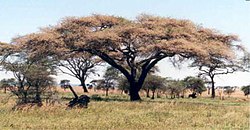Difference between revisions of "Acacia tortilis"
(Created page with '{{SPlantbox |familia=Fabaceae |genus=Acacia |species=tortilis |common_name=Umbrella thorn |name_ref=Flora - A Gardener's Encyclopedia |habit=tree |habit_ref=Flora - A Gardener'…') |
|||
| Line 1: | Line 1: | ||
{{SPlantbox | {{SPlantbox | ||
|familia=Fabaceae | |familia=Fabaceae | ||
| − | |genus=Acacia | + | |genus=Acacia |
| − | |species=tortilis | + | |species=tortilis |
|common_name=Umbrella thorn | |common_name=Umbrella thorn | ||
|name_ref=Flora - A Gardener's Encyclopedia | |name_ref=Flora - A Gardener's Encyclopedia | ||
| Line 28: | Line 28: | ||
|max_zone=11 | |max_zone=11 | ||
|jumpin=If this plant info box on watering; zones; height; etc. is mostly empty you can click on the edit tab and fill in the blanks! | |jumpin=If this plant info box on watering; zones; height; etc. is mostly empty you can click on the edit tab and fill in the blanks! | ||
| − | |image= | + | |image=Eat267.jpg |
|image_width=240 | |image_width=240 | ||
}} | }} | ||
| − | + | '''Umbrella Thorn Acacia''' (''Acacia tortilis'') also known as ''Umbrella Thorn'' and ''Israeli Babool'',<ref>[http://www.hort.purdue.edu/newcrop/duke_energy/Acacia_tortilis.html Acacia tortilis (Forsk.) Hayne], Perdue University, December 1997.</ref> is a medium to large canopied tree native primarily to the [[savanna]] and [[Sahel]] of [[Africa]] (especially [[Sudan]]), but also occurring in the [[Middle East]]. | |
| + | |||
| + | In extremely arid conditions, it may occur as a small, wiry bush. It grows up to {{convert|21|m|ft|abbr=on|lk=off}} in height.<ref>[http://www.worldagroforestrycentre.org/SEA/Products/AFDbases/AF/asp/SpeciesInfo.asp?SpID=118 World Agroforestry Centre]</ref> The love carries leaves that grow to approx. {{convert|2.5|cm|in|0|abbr=on|lk=off}} in length with between 4 and 10 pair of [[pinnae]] each with up to 15 pairs of leaflets. Flowers are small and white, highly [[aromatic]], and occur in tight clusters. Seeds are produced in pods which are flat and coiled into a springlike structure. | ||
| + | |||
| + | The plant is known to tolerate high [[alkalinity]], [[drought]], high temperatures, sandy & stony soils, strongly sloped rooting surfaces, and sand blasting. Also, plants older than 2 years have been observed to be somewhat frost resistant. | ||
==Cultivation== | ==Cultivation== | ||
| Line 43: | Line 47: | ||
==Varieties== | ==Varieties== | ||
| − | + | Subspecies: | |
| + | *[[Acacia tortilis subsp. heteracantha]] (Burchell)Brenan | ||
| + | *[[Acacia tortilis subsp. raddiana]] (Savi)Brenan | ||
| + | *[[Acacia tortilis subsp. spirocarpa]] (A.Rich.)Brenan | ||
| + | *[[Acacia tortilis subsp. tortilis]]<ref>[http://www.ildis.org/LegumeWeb/6.00/fam/f2.shtml ILDIS Legumes of the World]</ref> | ||
==Gallery== | ==Gallery== | ||
Latest revision as of 20:17, 24 August 2010
| Habit | tree
| |
|---|---|---|
| Height: | ⇕ | 30 ft"ft" can not be assigned to a declared number type with value 30. |
| Width: | ⇔ | 20 ft"ft" can not be assigned to a declared number type with value 20. to 30 ft"ft" can not be assigned to a declared number type with value 30. |
| Lifespan: | ⌛ | perennial |
| Bloom: | ❀ | early summer, mid summer, late summer |
| Exposure: | ☼ | sun |
|---|---|---|
| Features: | ✓ | flowers |
| USDA Zones: | 9 to 11 | |
| Flower features: | ❀ | orange, yellow, white |
|
Fabaceae > |
Acacia > |
tortilis > |
If this plant info box on watering; zones; height; etc. is mostly empty you can click on the edit tab and fill in the blanks!
Umbrella Thorn Acacia (Acacia tortilis) also known as Umbrella Thorn and Israeli Babool,[1] is a medium to large canopied tree native primarily to the savanna and Sahel of Africa (especially Sudan), but also occurring in the Middle East.
In extremely arid conditions, it may occur as a small, wiry bush. It grows up to 21 m ft in height.[2] The love carries leaves that grow to approx. 2.5 cm in 0 in length with between 4 and 10 pair of pinnae each with up to 15 pairs of leaflets. Flowers are small and white, highly aromatic, and occur in tight clusters. Seeds are produced in pods which are flat and coiled into a springlike structure.
The plant is known to tolerate high alkalinity, drought, high temperatures, sandy & stony soils, strongly sloped rooting surfaces, and sand blasting. Also, plants older than 2 years have been observed to be somewhat frost resistant.
Cultivation
Propagation
Pests and diseases
Varieties
Subspecies:
- Acacia tortilis subsp. heteracantha (Burchell)Brenan
- Acacia tortilis subsp. raddiana (Savi)Brenan
- Acacia tortilis subsp. spirocarpa (A.Rich.)Brenan
- Acacia tortilis subsp. tortilis[3]
Gallery
References
- ↑ Acacia tortilis (Forsk.) Hayne, Perdue University, December 1997.
- ↑ World Agroforestry Centre
- ↑ ILDIS Legumes of the World
External links
- w:Acacia tortilis. Some of the material on this page may be from Wikipedia, under the Creative Commons license.
- Acacia tortilis QR Code (Size 50, 100, 200, 500)

